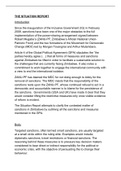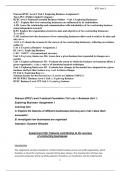Summary
Summary APC3701 - The Politics Of Southern Africa - The Situation report
- Institution
- University Of South Africa (Unisa)
The Situation Report attempts to clarify the contested matter of sanctions in Zimbabwe by outlining all the sanctions and measures mentioned in the GPA.
[Show more]





